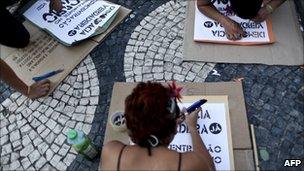The people versus a European elite
- Published
- comments

There are fears of a "lost generation" as countries such as Portugal and Greece face austerity
Each day or so, it seems, brings new warnings of a Europe adrift, uneasy with itself, where solidarity is under strain and where the European vision is fading.
Writing in the New York Times, Ross Douthat notes the "crisis of the European dream, external - the vision of a continent without borders or divisions, supervised by a benevolent and cosmopolitan elite".
In Britain's Observer newspaper, Will Hutton warns of "the onward march, external of Europe's populist, anti-immigrant, anti-Muslim, nativist right".
The crisis for Europe's leaders is that they are no longer automatically seen as on the side of the people.
So parties from the fringe are filling the vacuum; be it the National Front in France or the True Finns in Finland.
Immigration is one of the key issues turning people away from mainstream parties. The elite argued long and hard that migration was a force for prosperity.
But it can also mean that it adds to the competition for unskilled jobs.
During the recent debate about migration from North Africa, the response of some MEPs was to push for a common EU asylum and immigration policy which included "burden-sharing" between member states.
It is for many European officials a long-standing ideal - but it can sit uncomfortably in a Europe where over 24 million are without work.
'Ludicrous' funds
The same is true with austerity. Brussels has been preaching the need for belt-tightening, for reducing deficits, for countries to live within their means.
And yet the Commission seeks an increase to its budget. The suggestion that some of the thousands of EU officials, with their tax-free salaries, might take a cut are ridiculed. But that, I suspect, is not how the voters see it.
Yesterday a British minister described as "ludicrous" the extra funds requested to run the EU's diplomatic service, at a time when national welfare programmes are being cut.
But perhaps the most serious criticism of Europe's elite relates to their handling of the crisis in the eurozone.
They have insisted that the only way forward is slashing spending and reducing deficits. But the strategy divides opinion. The economist Paul Krugman notes that "objections that these programs , externalwould be self-defeating - not only would they impose large direct pain, but they also would, by worsening the economic slump, reduce revenues - were waved away."
Rightly or wrongly, this is the charge that is bringing new support to fringe parties; that in order to defend the single currency an entire generation in countries like Greece, Ireland and Portugal is being forced to accept savage austerity. Taxpayers have taken a hit instead of the banks.
It is a point that has been seized on by Timo Soini of the True Finns. He said that "instead of accepting losses, external on unsound investments... it was decided to transfer the losses to taxpayers via loans, guarantees and opaque contracts..."
'Fractured politics'
He insists he is not anti-European but is dismissed in Brussels as a populist. But many, many voters across Europe doubt the bail-outs, the cuts, or the structural reforms are working and when given the chance, they punish their leaders.
Interestingly, at the very highest levels of the German government there is a recognition of frustration with the EU, that it can often leave people feeling powerless. I heard one senior figure say recently it didn't mean a lesser Europe but a different Europe with less red tape.
It is easy to dismiss these fringe parties as populist or racist but part of their success lies in combining fears about immigration with fears about the economy.
The Economist recently observed a new fracture in politics "between those , externalwho believe in globalisation, international governance and open borders and those who believe in the primacy of the nation state."
Across Europe voters feel insecure, suspicious of an elite with its own vision of an ever closer union but which doesn't necessarily address their hopes or fears.